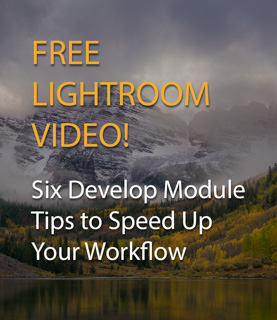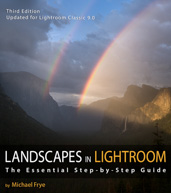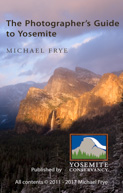In the Moment:
Michael Frye's Landscape Photography Blog
by Michael Frye | Sep 8, 2019 | Light and Weather
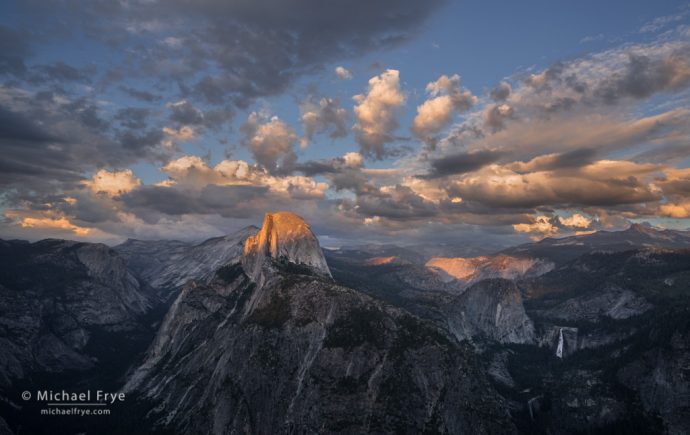
Half Dome and Nevada Fall at sunset from Glacier Point, Yosemite
While summer is the dry season in California, monsoonal moisture often pushes up from Mexico during this season, triggering afternoon thunderstorms in the mountains. But there hasn’t been much of that this year. It’s been one sunny day after another. While the typical late-summer monsoons made their way to Arizona, Utah, New Mexico, and Colorado, they never reached this far west.
Last week, however, some of that monsoonal moisture finally arrived in the Sierra, and on Tuesday, Wednesday, and Thursday, clouds and thunderstorms developed over the high country.
(more…)
by Michael Frye | Aug 18, 2019 | Light and Weather
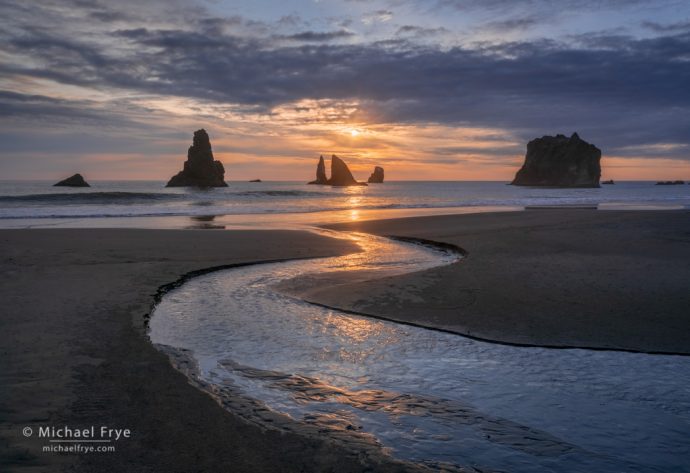
Creek flowing into the Pacific Ocean, Oregon coast. 26mm, five bracketed exposures at f/16, ISO 100, blended with Lightroom’s HDR Merge, then blended back with one of the original images in Photoshop to eliminate ghosting.
Summer is fog season along the west coast. Currents and upwelling bring cool water to the surface near the shore, and when warm, moist air blowing off the Pacific encounters that cold water the air temperature near the surface drops to meet the dew point, creating the right conditions for fog formation.
Usually that fog layer lifts above sea level, so along the shore it looks like a low overcast. That stratus deck might break up late in the morning, but often starts to re-form toward sunset, building back into a solid overcast by morning.
(more…)
by Michael Frye | Aug 14, 2019 | Announcements
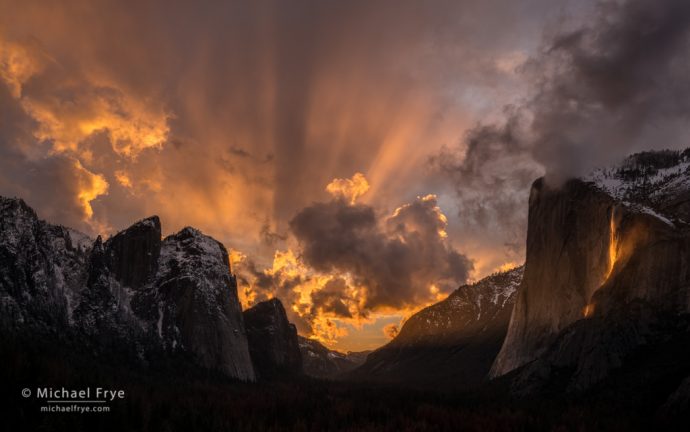
Sunset over Yosemite Valley with Cathedral Rocks, El Capitan, and Horsetail Fall, Yosemite
This is a friendly reminder that my print prices will be increasing on August 18th – just four days from now!
My matted, signed, limited-edition 16×20 prints will increase from $325 to $450. 20x24s will go from $475 up to $650, 24x30s from $750 to $975, and 30x40s from $1100 to $1350.
(more…)
by Michael Frye | Aug 13, 2019 | Travels and Stories
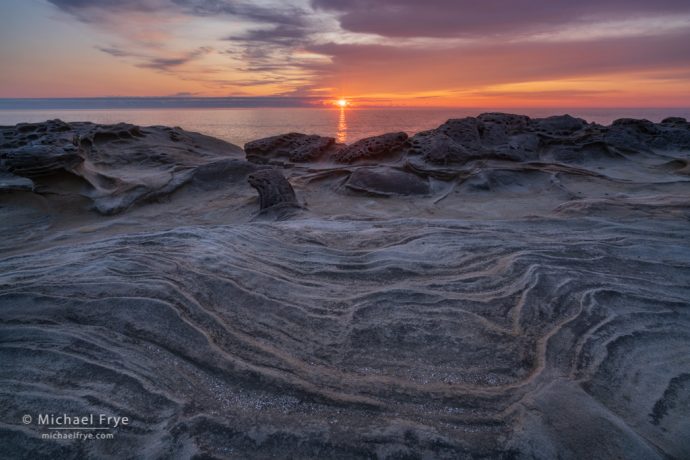
Sunset and sandstone formations, Oregon coast. 16mm, five bracketed exposures at f/16, ISO 100, blended with Lightroom’s HDR Merge, then blended back with one of the original images in Photoshop to eliminate ghosting.
Recently Claudia and I visited our friends Gary and Charlotte Gibb up near Mt. Shasta, where they were renting a house for the week. We had a great time hanging out with them for a couple of days. And then we thought, we’re so close, maybe we should visit the Oregon coast. So we did.
I’ve never spent much time along the Oregon coast, but it’s a beautiful area, and a popular photography destination for a reason, so it’s one of those places that I’ve wanted to explore more thoroughly.
(more…)
by Michael Frye | Aug 4, 2019 | Night Photography
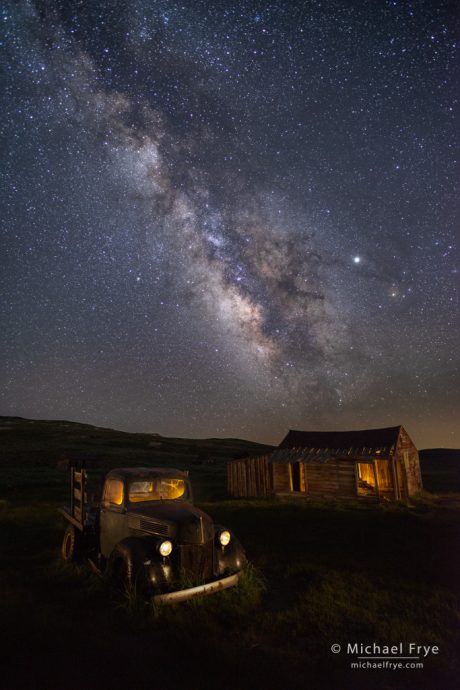
Old truck and shed underneath the Milky Way, Bodie. Nighttime photography can get pretty complex, often requiring multiple frames to reduce noise, or create intricate lighting. Here I captured twelve frames of the Milky Way, and blended them together with Starry Landscape Stacker to reduce noise. Then I took that image into Photoshop, where I blended it with seven light-painting frames – the truck from two sides, the shed from two sides, a frame for the interior lights (small lights placed inside the shed and against the truck windows), and two frames for lighting the headlights.
On Thursday I had an opportunity to photograph Bodie at night. I’ve done that many times before, but always while leading a workshop group. This time I joined a small group of photographers on my friend Rick Whitacre‘s permit, and the five of us had this amazing ghost town to ourselves for an evening.
It’s always fun leading a group in Bodie, but it was nice, for a change, to just concentrate on my own photography. I had a mental checklist of images I hadn’t been able to try yet, and this was the perfect chance to do that. We also had a couple hours of daylight to scout, and I found several new possibilities. The most intriguing of these, to me, was a star-trail image of wagons in an old barn, which I ended up trying – it’s the first image below.
(more…)
by Michael Frye | Jul 28, 2019 | Light and Weather, Yosemite Photo Conditions
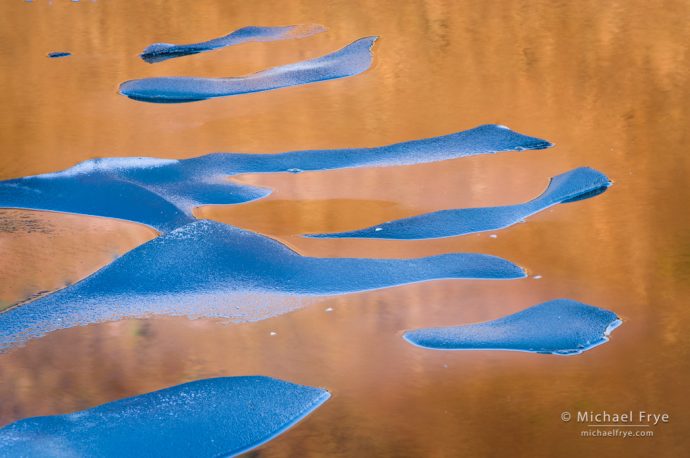
ice fingers, Yosemite. 200mm, 1/4 second at f/16, ISO 100, focus-stacked and blended with Helicon Focus.
I always try to drive over Tioga Pass right after it opens in hopes of finding still-snowy peaks, and melting ice on some of the high-country lakes. This year’s big snowpack delayed the full opening of Tioga Road until July 1st, so I thought there would still be lots of snow up there. But when we drove over the pass on July 2nd we found less snow and ice than I expected. The peaks had some snow, but not as much as in 2017, and the lakes near the road were ice-free.
Later, while scouting for our high-country workshop, I did find some ice on higher lakes, away from the road. And our workshop group got to photograph a small patch of ice on one lake before it all melted. I think if we had arrived at that lake one day later the ice would have been gone.
(more…)
by Michael Frye | Jul 21, 2019 | Workshops
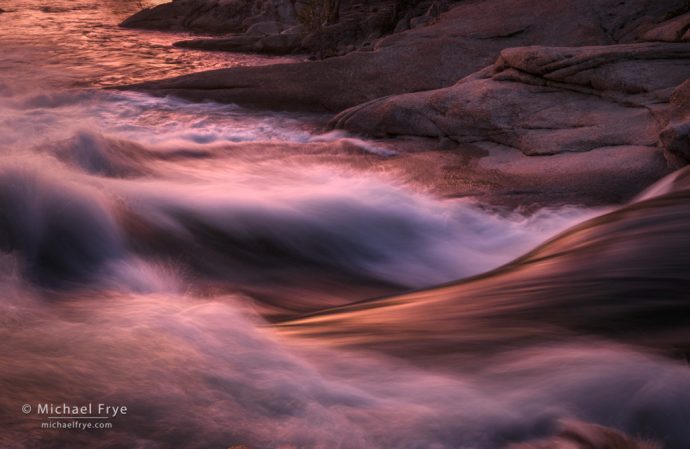
Sunset glow on the Tuolumne River, Yosemite. On our last evening some high clouds to the west turned orange and red at sunset, reflecting that golden glow into the water. 35mm, 1/2 second at f/16, ISO 500.
Claudia and I just got back home after spending about ten days in the eastern Sierra and Yosemite high country for our Range of Light workshop.
We borrowed the name of this workshop from John Muir, who famously called the Sierra Nevada “The Range of Light.” It’s worth reading the full quote – Muir at his best:
(more…)
by Michael Frye | Jul 11, 2019 | Composition
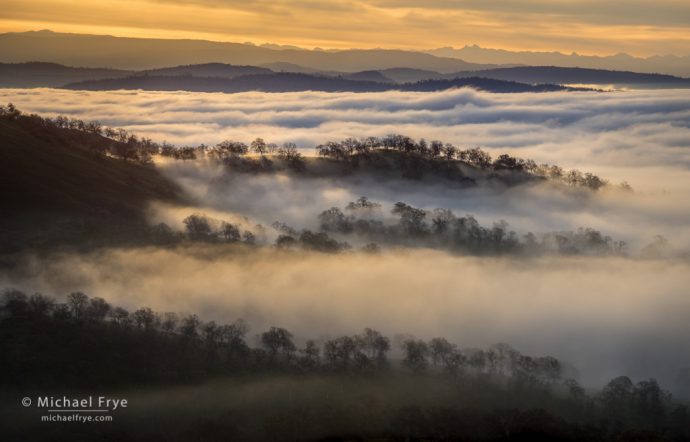
Ridges and peaks above the fog in the Sierra Nevada foothills, California (170mm)
One of my most popular posts was about creating a sense of depth in landscape photographs. In that post I talked about the most common formula for creating depth: a near-far juxtaposition with a wide-angle lens. And then I looked at other, less-common ways of creating depth, like atmospheric effects, perspective lines, and using an elevated vantage point to show a foreground, middle ground, and background. (If you haven’t read that post I recommend doing so; you’ll find it here.)
Creating a sense of depth in a two-dimensional medium like photography can be challenging. There’s no question that the wide-angle, near-far formula works, and in general it’s easier to make photographs with depth using shorter focal lengths rather than longer ones. Telephoto lenses are often better suited to compressing space, and finding two-dimensional patterns and designs out of a three-dimensional world.
(more…)
by Michael Frye | Jun 30, 2019 | Announcements, Yosemite Photo Conditions
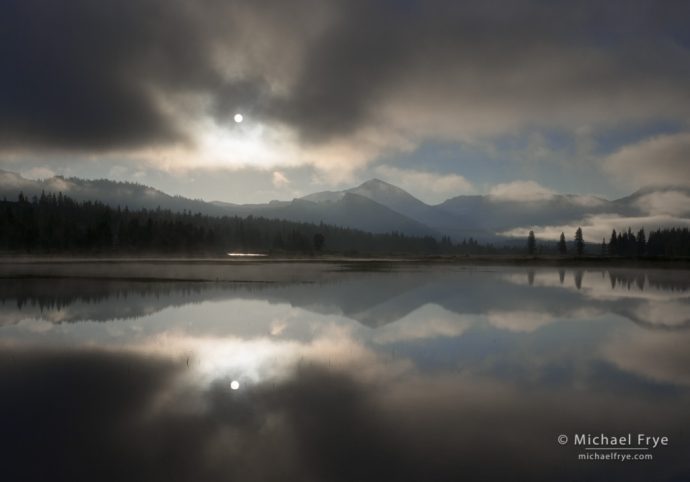
Sun breaking through mist, Yosemite, July 2011
Tioga Pass will be opening fully tomorrow, July 1st – one of its latest opening dates ever. For the past week or so the pass has been open on a limited basis, from 10 to 11 a.m. and 3 to 4 p.m. each day, with no stopping or “recreating” allowed. But starting tomorrow it will be open 24 hours, with stopping and recreating – including photography! – permitted.
(more…)
by Michael Frye | Jun 26, 2019 | Announcements
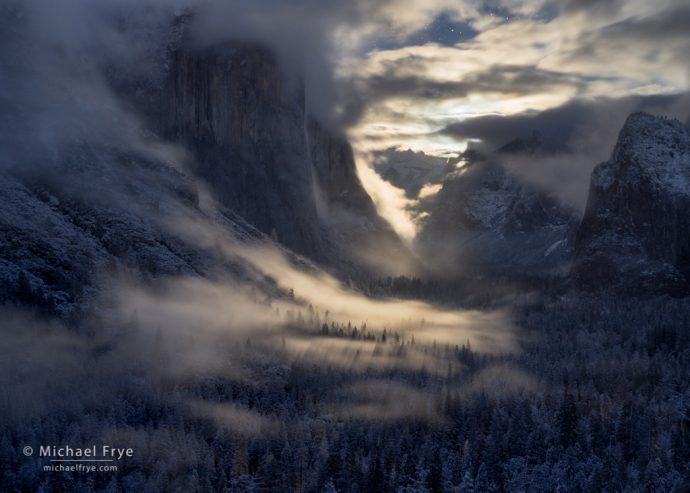
Clearing storm by moonlight from Tunnel View, Yosemite NP, CA, USA
I’m pleased to announce that Kirk Keeler and I will have an exhibit of nighttime photographs at The Ansel Adams Gallery in Yosemite from June 30th to August 17th. Called “Yosemite at Night,” the show will offer a different perspective on this park by showing its iconic landscapes under the light of the moon and stars.
The gallery will be holding an artist’s reception on July 24th from 3:00 to 5:00 p.m. The Ansel Adams Gallery is located next to the Visitor Center in Yosemite Valley.
(more…)











